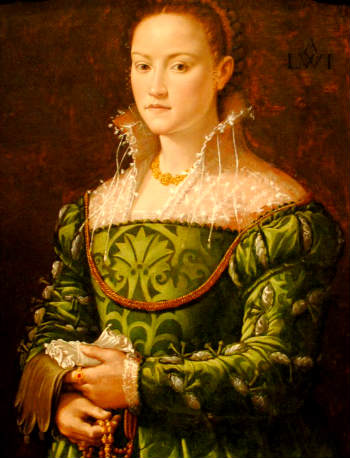100 Greatest Painters Artists Alphabetically Artists by Country Artists by Century Artists by Movement
Alessandro Allori
1535 - 1607
Italian Florentine Mannerist Painter
Influences: Jacopo da Pontormo, Agnolo Bronzino and Michelangelo
Cause of Death - Old Age

Description of the Mannerist Style
Originating in Italy, the term mannerism comes from the Italian 'maniera', which translates to 'style'. Mannerism is an artistic style that was born in the early 1500s. The style originated in Rome and later widened to all of Europe. The paintings are highly charged with emotional energy, twisting poses, filling the canvas with electrifying, pulsating colors. The Mannerists in Italy worked on generous commission for a restricted audience of Vatican powerbrokers and royalty. The subjects they were allowed to portray was controlled and restricted to biblical themes, portraits and occasionally mythology. El Greco said to hell with the money went off to Spain to pursue his own remarkable vision.
Masters of The Mannerist Style
The Meaning of Sacred Symbols in Paintings. Most prominently featured symbols and their meaning:
☼☼☼☼☼
Important Words, People, Phrases, Characteristics related to the Italian Renaissance Art Movement - rebirth, rediscovery of the classical world, City-state, Humanism, Humanist, Francesco Petrarch, Reform, The Prince, Theocracy, The Inquisition, Human Reasoning, Medici Academy, publication of Della Pittura, a book about the laws of mathematical perspective for artists, sfumato, chiaroscuro, linear perspective, Heliocentric Theory, Petrarch, Baldassare Castiglione, The Book of the Courtier, liberal arts, civic humanism, Verrocchio, secularism, Leonardo Bruni, Lorenzo Valla, Neo-Platonism, nominalism, Giotto, Masaccio, Botticelli, Quattrocento, vanishing point, Savonarola, oligarchy spiritually significant, illuminated manuscript, idealized biblical themes, scriptorium, emotion, illuminator, iconoclast, Michelangelo and Leonardo Da Vinci, Age of Discovery, axonometric drawing, curiosity about the natural world, mythology, realistic use of colours and light, Bonfire of the Vanities, Old Testament stories, ethereal and foggy backgrounds, Gospel parables, The Blackdeath, romanticized landscapes, Christian symbolism. Paradise
☼☼☼☼☼
If you feel you have worthwhile information you would like to contribute we would love to hear from you. We collect essential biographical information and artist quotes from folks all over the globe and appreciate your participation. When submitting please, if possible, site the source and provide English translation. Email to historyofpainter@gmail.com
© HistoryofPainters.com 2017
If you like this page and wish to share it, you are welcome to link to it, with our thanks.
Popular Questions About Renaissance Art History
What is the difference between Italian Renaissance art and Northern Renaissance art?
How did the Black Death impact European art history?
How did the Inquisition impact European art history?
What was the influence of the Medici Academy on Renaissance painters?
What was the Bonfire of the Vanities?
Who were the greatest painters of the Renaissance?